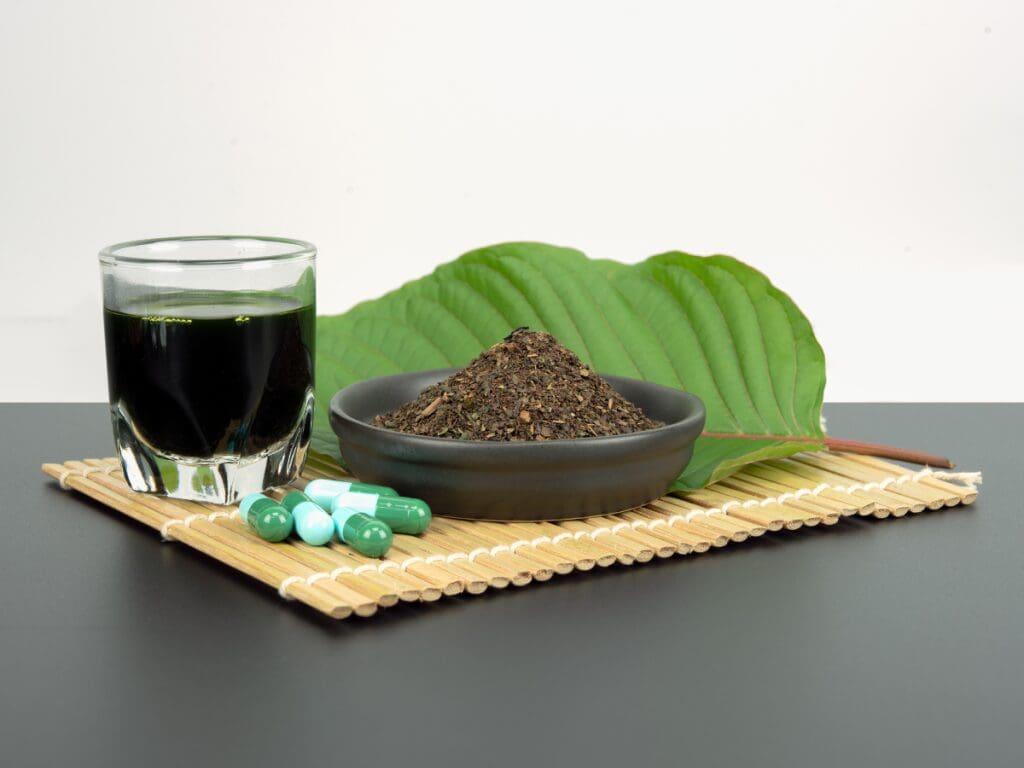Key Takeaways:
- Versatile Health Benefits: Kratom offers diverse health benefits, including pain relief, enhanced energy, mood support, and aid for opioid withdrawal.
- Safe Usage Practices: Using kratom responsibly involves starting with low doses, understanding potential side effects, and choosing reputable sources.
- Historical and Cultural Significance: Kratom has a rich history in Southeast Asia, where it has been used traditionally for centuries for its medicinal properties.
At Happy Hemp, we pride ourselves on delivering high-quality CBD, mushroom, and Delta-8 THC products. Our commitment to excellence ensures that every product we offer meets the highest standards of quality, safety, and effectiveness. By investing in rigorous testing methods and sustainable practices, we strive to enhance the well-being of our customers. Whether you are new to natural wellness or an experienced user, our diverse product range is designed to support your health journey.
Kratom, scientifically known as Mitragyna speciosa, is a tropical evergreen tree native to Southeast Asia, particularly in countries like Thailand, Indonesia, Malaysia, and Papua New Guinea. For centuries, the leaves of this plant have been used in traditional medicine for their stimulant and sedative properties. In recent years, kratom has gained popularity in the Western world as a natural supplement for various health benefits. This article aims to provide a comprehensive overview of kratom, its benefits, and how it can be incorporated into a wellness routine.
History And Origins Of Kratom
The use of kratom dates back hundreds of years in Southeast Asia, where it has been an integral part of traditional medicine and culture. The indigenous people of Thailand, Malaysia, and Indonesia have long used kratom leaves for their stimulating effects, often chewing them to increase energy, combat fatigue, and enhance productivity, particularly among laborers and farmers.
In addition to its stimulant properties, kratom has also been utilized for its medicinal benefits. Traditional healers have used kratom to treat a variety of ailments, including pain, diarrhea, and cough. The leaves were sometimes brewed into a tea or used in poultices to address wounds and inflammation.
Despite its historical and cultural significance in Southeast Asia, kratom remained relatively unknown in the Western world until the late 20th century. As interest in natural and herbal supplements grew, kratom began to attract attention for its potential health benefits. Today, it is widely available in various forms, including powders, capsules, and extracts, making it accessible to a global audience.
Happy Hemp’s Kratom Gummies offer a modern, convenient way to experience kratom’s benefits in delicious, pre-measured doses. Try Happy Hemp’s Kratom Gummies today and enjoy the ease and taste!
How Kratom Works In The Body
Kratom’s effects on the body are primarily due to its rich content of active compounds called alkaloids. The two most significant alkaloids in kratom are mitragynine and 7-hydroxymitragynine. These alkaloids interact with the body’s opioid receptors, although kratom itself is not an opioid. This interaction is responsible for many of kratom’s effects, which can range from stimulation to relaxation, depending on the dosage and strain.
Mechanism Of Action
At lower doses, kratom tends to act as a stimulant. Users often report increased energy, alertness, and sociability. This stimulant effect is thought to be due to the action of mitragynine on the body’s adrenergic receptors, which are involved in the body’s fight-or-flight response.
At higher doses, kratom has sedative effects, helping to relieve pain and promote relaxation. This is primarily due to the action of 7-hydroxymitragynine, which has a high affinity for the body’s mu-opioid receptors, similar to those targeted by opioids. However, kratom’s unique profile means it typically does not cause the severe side effects associated with synthetic opioids.
Additional Effects
In addition to its primary effects, kratom also has anti-inflammatory and antioxidant properties, which can contribute to overall health and well-being. These effects are attributed to the various other alkaloids and compounds present in the plant.
The diverse effects of kratom make it a versatile supplement, but they also underscore the importance of understanding how to use it properly to achieve the desired outcomes.
Health Benefits Of Kratom
Kratom has gained attention for its potential health benefits, which have been supported by both traditional use and emerging scientific studies. Here are some of the notable health benefits associated with kratom:
Pain Management
One of the most well-known uses of kratom is for pain relief. The alkaloids in kratom, particularly 7-hydroxymitragynine, interact with opioid receptors in the brain to help alleviate pain. This makes kratom a popular natural alternative for managing chronic pain conditions, such as arthritis, fibromyalgia, and back pain.
Enhanced Energy And Focus
At lower doses, kratom acts as a stimulant, providing a boost in energy and mental clarity. Many users report increased focus, motivation, and endurance, making it a favored supplement for those needing to enhance their productivity or combat fatigue.
Mood Enhancement And Anxiety Relief
Kratom’s interaction with the brain’s receptors can also lead to improved mood and reduced anxiety. It is often used to help manage symptoms of depression and anxiety, promoting a sense of well-being and relaxation. The mood-enhancing effects are attributed to the release of endorphins and other neurotransmitters that create a feeling of happiness and contentment.

Support For Opioid Withdrawal
Kratom has shown promise in helping individuals manage opioid withdrawal symptoms. Because it binds to the same receptors as opioids, kratom can help alleviate the physical and psychological symptoms associated with withdrawal, such as pain, anxiety, and cravings. This has made it a valuable tool for those seeking to reduce or eliminate their dependence on opioids.
Different Forms Of Kratom
Kratom is available in several forms, each offering unique advantages depending on personal preferences and specific needs. Here are the most common forms of kratom and their uses:
Kratom Powder
Kratom powder is made by drying and grinding kratom leaves into a fine consistency. This is the most versatile form of kratom, as it can be mixed into beverages, added to food, or encapsulated for easy consumption. Kratom powder allows for precise dosage adjustments and is widely available in various strains.
Kratom Capsules
Kratom capsules offer a convenient and discreet way to consume kratom. Each capsule contains a pre-measured dose of kratom powder, making it easier to manage dosage without the need for measuring. Capsules are ideal for those who dislike the taste of kratom or prefer a mess-free option.
Kratom Edibles And Gummies
Kratom edibles, including gummies, are a newer and increasingly popular way to consume kratom. These products are infused with kratom extract and offer a tasty, convenient, and discreet option. Edibles and gummies are pre-dosed, making it easy to control intake. They are particularly appealing to those who dislike the taste of kratom powder or tea.
Kratom Extracts
Kratom extracts are concentrated forms of kratom, where the active compounds are extracted from the leaves and made into a potent liquid or powder. Extracts are typically more powerful than standard kratom powder and are used in smaller quantities. They are suitable for experienced users seeking a stronger effect or for those who need higher doses for therapeutic purposes.
Kratom Tea
Kratom tea is made by brewing kratom leaves or powder in hot water. This traditional method of consumption is popular in Southeast Asia and offers a soothing and enjoyable way to take kratom. The tea can be flavored with honey, lemon, or other additives to improve its taste. Drinking kratom as tea can also help with gradual absorption of the alkaloids.
How To Use Kratom Safely
Using kratom safely is crucial to maximizing its benefits while minimizing potential risks. Here are some guidelines to help ensure responsible and effective use of kratom:
Start With A Low Dose
If you’re new to kratom, it’s important to start with a low dose to see how your body reacts. Beginners should start with 1-2 grams of kratom powder. If using capsules, this is typically equivalent to 1-2 capsules, depending on their size. Wait at least 30-45 minutes to assess the effects before considering an additional dose.
Find The Right Strain
Different kratom strains have varying effects. For instance, some strains are more stimulating, while others are more relaxing. Popular strains include Maeng Da, Bali, and Green Malay. Experiment with different strains to find the one that best suits your needs.
Use In Moderation
Moderation is key to using kratom safely. Avoid taking high doses, especially if you’re inexperienced with the herb. High doses can lead to adverse effects such as nausea, dizziness, and sedation. It’s also advisable to avoid using kratom every day to prevent the development of tolerance and dependence.
Stay Hydrated
Kratom can be dehydrating, so it’s important to drink plenty of water throughout the day, especially when consuming kratom. Staying hydrated can help prevent common side effects such as dry mouth and constipation.
Be Aware Of Potential Interactions
Kratom can interact with other medications and substances, potentially leading to harmful effects. Avoid mixing kratom with alcohol, opioids, or other sedatives. If you are taking prescription medications, consult with a healthcare professional before using kratom to avoid any dangerous interactions.
Listen To Your Body
Pay attention to how your body responds to kratom. If you experience any negative side effects, such as nausea, headaches, or agitation, reduce your dose or discontinue use. Everyone’s body is different, and what works for one person may not work for another.
Potential Side Effects And Risks
While kratom offers various health benefits, it is essential to be aware of its potential side effects and risks to ensure safe use. Here are some of the most common concerns associated with kratom consumption:
Common Side Effects
- Nausea and Vomiting: One of the most frequently reported side effects, especially at higher doses.
- Constipation: Kratom can slow down digestive processes, leading to constipation. Staying hydrated and maintaining a high-fiber diet can help mitigate this issue.
- Dizziness and Drowsiness: High doses of kratom can cause dizziness and drowsiness, which may impair your ability to perform tasks that require alertness, such as driving.
- Dry Mouth: Kratom can lead to dry mouth, so it is important to stay hydrated.
Serious Risks
- Interactions with Medications: Kratom can interact with various medications, including antidepressants, blood pressure medications, and opioids. Such interactions can lead to dangerous side effects or reduce the effectiveness of your medications.
- Respiratory Depression: In very high doses, kratom can cause respiratory depression, a condition where breathing becomes slow and shallow. This is more likely to occur when kratom is combined with other depressants like alcohol or opioids.
Regulatory Concerns
The legal status of kratom varies by country and even by state within countries. In some places, kratom is banned or regulated due to concerns about its safety and potential for abuse. Always check the legal status of kratom in your area before purchasing or using it.
Quality and Purity
Since kratom is not regulated by the FDA, there is a risk of contamination or adulteration with harmful substances. To reduce this risk, purchase kratom from reputable sources that provide lab testing for purity and potency.
By understanding these potential side effects and risks, you can make informed decisions about using kratom and take steps to minimize any adverse effects.

Final Thoughts
Kratom, a traditional herbal supplement from Southeast Asia, has garnered significant attention for its potential health benefits. From providing pain relief and enhancing energy and focus to supporting mood and aiding in opioid withdrawal, kratom offers a versatile range of effects that can cater to various wellness needs.
However, like any supplement, it is crucial to use kratom responsibly. Understanding the different forms of kratom, starting with low doses, and being aware of potential side effects and risks can help ensure safe and beneficial use. Additionally, choosing reputable sources for your kratom products is essential to avoid contamination and ensure quality.
By incorporating these guidelines, individuals interested in natural wellness can explore the benefits of kratom while minimizing any potential drawbacks. As with any health supplement, consulting with a healthcare professional before starting kratom is always a good practice, especially if you have underlying health conditions or are taking other medications.
With a balanced approach, kratom can be a valuable addition to a natural wellness regimen, offering an array of benefits derived from centuries of traditional use and modern exploration.
Read also:
- Is Delta 8 Bad for Your Health
- Unveiling Cannabis: How It Affects the Brain and Body
- Gen Z and Cannabis: How the Youngest Generation is Shaping the Future of Cannabis
Frequently Asked Questions About Kratom’s Benefits
What is the best way to take kratom for beginners?
Beginners should start with a low dose of kratom powder or capsules, ideally 1-2 grams, to assess tolerance and effects. Gradually increasing the dose if needed is recommended.
How long do the effects of kratom last?
The effects of kratom can last between 2 to 5 hours, depending on the dose and individual metabolism. Higher doses may result in longer-lasting effects.
Can kratom be used for chronic pain management?
Yes, kratom is often used for chronic pain management due to its analgesic properties. It can provide relief for conditions like arthritis, fibromyalgia, and back pain.
How does kratom compare to other herbal supplements?
Kratom is unique due to its dual stimulant and sedative effects, depending on the dose. Unlike other herbal supplements, it interacts with opioid receptors, offering pain relief and mood enhancement.
Is kratom safe for everyone?
Kratom may not be safe for everyone, especially individuals with certain health conditions or those taking specific medications. It is important to consult with a healthcare provider before using kratom.
Can kratom be used as a pre-workout supplement?
Yes, at low doses, kratom’s stimulant properties can enhance energy and focus, making it a potential pre-workout supplement. However, it should be used carefully to avoid any adverse effects.
Sources:
- Boyer, E. W., Babu, K. M., Adkins, J. E., McCurdy, C. R., & Halpern, J. H. (2008). Self‐treatment of opioid withdrawal using kratom (Mitragynia speciosa korth). Addiction, 103(6), 1048-1050.
- Prozialeck, W. C., Jivan, J. K., & Andurkar, S. V. (2012). Pharmacology of kratom: an emerging botanical agent with stimulant, analgesic and opioid-like effects. Journal of Osteopathic Medicine, 112(12), 792-799.
- Grundmann, O., Hendrickson, R. G., & Greenberg, M. I. (2023). Kratom: history, pharmacology, current user trends, adverse health effects and potential benefits. Disease-a-Month, 69(6), 101442.
- Hartley, C., Bulloch, M., & Penzak, S. R. (2022). Clinical pharmacology of the dietary supplement kratom (Mitragyna speciosa). The Journal of Clinical Pharmacology, 62(5), 577-593.







